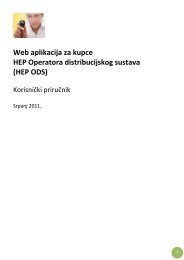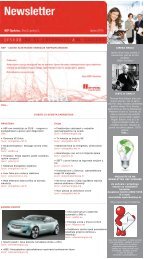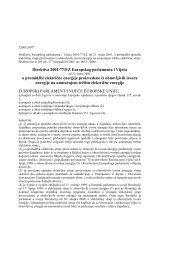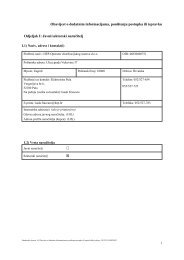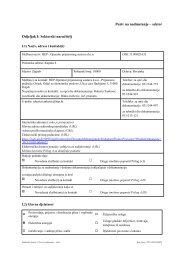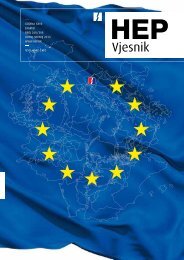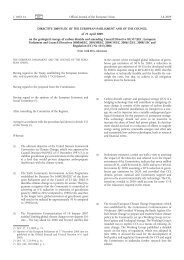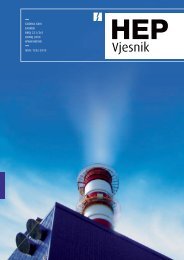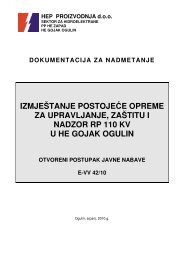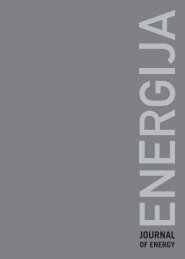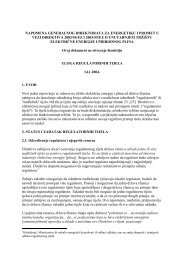DRAVA, KUPA, RJE»INA, LOKVARKA, LI»ANKA LIKA, DOBRA ...
DRAVA, KUPA, RJE»INA, LOKVARKA, LI»ANKA LIKA, DOBRA ...
DRAVA, KUPA, RJE»INA, LOKVARKA, LI»ANKA LIKA, DOBRA ...
You also want an ePaper? Increase the reach of your titles
YUMPU automatically turns print PDFs into web optimized ePapers that Google loves.
128<br />
HEP ANNUAL REPORT 2010<br />
CHAPTER 6 - FINANCIAL STATEMENTS<br />
HEP d.d. ∑<br />
FINANCIAL STATEMENTS<br />
INDEPENDENT AUDITOR’S REPORT<br />
To the Owner of Hrvatska elektroprivreda d.d.:<br />
We have audited the unconsolidated accompanying financial statements of Hrvatska elektroprivreda d.d. (the<br />
‘Company’), which comprise the unconsolidated statement of financial position as at 31 December 2010 and the<br />
related unconsolidated statement of income, unconsolidated statement of comprehensive income, unconsolidated<br />
statement of changes in equity and unconsolidated statement of cash flows for the year then ended, and a summary<br />
of significant accounting policies and other explanatory notes.<br />
MANAGEMENT’S RESPONSIBILITY FOR THE UNCONSOLIDATED FINANCIAL STATEMENTS<br />
Management is responsible for the preparation and fair presentation of these unconsolidated financial statements<br />
in accordance with International Financial Reporting Standards, and for such internal control as management determines<br />
is necessary to enable the preparation of unconsolidated financial statements that are free from material<br />
misstatement, whether due to fraud or error.<br />
AUDITOR’S RESPONSIBILITY<br />
Our responsibility is to express an opinion on these unconsolidated financial statements based on our audit. Except<br />
as provided in paragraph a) below, we conducted our audit in accordance with International Standards on Auditing.<br />
Those standards require that we comply with ethical requirements and plan and perform the audit to obtain reasonable<br />
assurance whether the unconsolidated financial statements are free from material misstatement.<br />
An audit involves performing procedures to obtain audit evidence about the amounts and disclosures in the<br />
financial statements. The procedures selected depend on the auditor’s judgment, including the assessment of the risks<br />
of material misstatement of the unconsolidated financial statements, whether due to fraud or error. In making those<br />
risk assessments, the auditor considers internal control relevant to the entity’s preparation and fair presentation of<br />
the unconsolidated financial statements in order to design audit procedures that are appropriate in the circumstances,<br />
but not for the purpose of expressing an opinion on the effectiveness of the entities’ internal control. An audit also<br />
includes evaluating the appropriateness of accounting policies used and the reasonableness of accounting estimates<br />
made by management, as well as evaluating the overall presentation of the unconsolidated financial statements.<br />
We believe that the audit evidence we have obtained is sufficient and appropriate to provide a basis for our<br />
audit opinion.<br />
MATTERS AFFECTING THE OPINION<br />
a) Prepayment to Hrvatske autoceste d.o.o.<br />
As described in Note 12, the Company advanced HRK 300 million to Hrvatske autoceste d.o.o. in December 2006<br />
for the acquisition of electricity facilities on the Croatian motorways within two years from the date of the advance<br />
payment. As of the date of these financial statements, the legal title to those facilities has not yet been transferred<br />
to the Company. The Company is the economic beneficiary of the electricity facilities, which it uses for their intended<br />
economic purposes and in the supply of electricity to customers. As of the date of publication of these financial statements,<br />
the Company has not classified the advance payment by type of assets used in the Company’s business, and<br />
we have received no calculation of the economic impact of the reclassification of those assets from prepayments<br />
to assets in use and the related depreciation from the Management Board. As a result, we are unable to assess the<br />
impact of this matter on the Company’s financial statements.<br />
b) Impairment allowance on receivables<br />
The auditor’s opinion on the unconsolidated financial statements for the year ended 31 December 2009 was qualified<br />
in respect of the provision for bad and doubtful receivables. At 31 December 2009, a provision for doubtful<br />
receivables of approximately HRK 60 million and the related taxation effect of approximately HRK 12 million were not<br />
recorded. During 2010, the Company recognised a provision for those receivables in the statement of comprehensive<br />
income. Accordingly the result for the year ended 31 December 2009 and shareholder’s equity at 31 December 2009<br />
were overstated by approximately HRK 48 million and the result for the year ended 31 December 2010 has been<br />
understated by the same amount.



